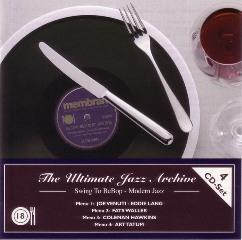The Ultimate Jazz Archive Vol.69 – Joe Venuti & Eddie Lang [1926-1933] [2005]
The Ultimate Jazz Archive Vol.69 – Joe Venuti & Eddie Lang [1926-1933] [2005]

01.Black And Blue Bottom 02.Stringin’ The Blues 03.Wild Cat 04.Suneshine 05.Goin’ Places 06.Doin’ Things 07.Kickin’ The Cat 08.Beatin’ The Dog 09.Cheese And Crackers 10.Penn Beach Boys 11.Dinah 12.The Wild Dog 13.Sweet Sue, Just You 14.I’ve Found A New Baby 15.I’ll Never Be The Same 16.Little Girl 17.The Wolf Wobble 18.Raggin’ The Scale
Although renowned as one of the world's great practical jokers (he once called a couple dozen bass players with an alleged gig and asked them to show up with their instruments at a busy street corner just so he could view the resulting chaos), Joe Venuti's real importance to jazz is as improvised music's first great violinist. He was a boyhood friend of Eddie Lang (jazz's first great guitarist) and the duo teamed up in a countless number of settings during the second half of the 1920s, including recording influential duets. Venuti moved to New York in 1925, and immediately he and Lang were greatly in demand for jazz recordings, studio work, and club appearances. Venuti seemed to play with every top white jazz musician during the segregated era and, in 1929, he and Lang joined Paul Whiteman's Orchestra, appearing in the film The King of Jazz.
Lang's premature death in 1933 was a major blow to Venuti, who gradually faded away from the spotlight. In 1935, after visiting Europe, the violinist formed a big band and, although it survived quite awhile and helped introduce both singer Kay Starr and drummer Barrett Deems, it was a minor-league orchestra that only recorded four songs (which Venuti characteristically titled "Flip," "Flop," "Something," and "Nothing"). His brief stint in the military during World War II ended the big band, and when he was discharged, Venuti stuck to studio work in Los Angeles. He was regularly featured on Bing Crosby's early-'50s radio show, but in reality the 1936-1966 period was the Dark Ages for Venuti as he drifted into alcoholism and was largely forgotten by the jazz world. However, in 1967 Joe Venuti began a major comeback, playing at the peak of his powers at Dick Gibson's Colorado Jazz Party. His long-interrupted recording career resumed with many fine sessions (matching his violin with the likes of Zoot Sims, Earl Hines, Marian McPartland, George Barnes, Dave McKenna, and Bucky Pizzarelli, among others) and, despite his increasingly bad health, Venuti's final decade was a triumph. ---Scott Yanow, Rovi
The first jazz guitar virtuoso, Eddie Lang was everywhere in the late '20s; all of his fellow musicians knew that he was the best. A boyhood friend of Joe Venuti, Lang took violin lessons for 11 years but switched to guitar before he turned professional. In 1924, he debuted with the Mound City Blue Blowers and was soon in great demand for recording dates, both in the jazz world and in commercial settings. His sophisticated chord patterns made him a superior accompanist who uplifted everyone else's music, and he was also a fine single-note soloist. He often teamed up with violinist Venuti (including some classic duets) and played with Red Nichols' Five Pennies, Frankie Trumbauer, and Bix Beiderbecke (most memorably on "Singing the Blues"), the orchestras of Roger Wolfe Kahn, Jean Goldkette, and Paul Whiteman (appearing on one short number with Venuti in Whiteman's 1930 film The King of Jazz), and anyone else who could hire him. A measure of Lang's versatility and talents is that he mostly played the chordal parts on a series of duets with Lonnie Johnson (during which he used the pseudonym Blind Willie Dunn), yet on his two duets with Carl Kress (whose chord voicings were an advancement on Lang's), he played the single-note leads. Eddie Lang, who led some dates of his own during 1927-1929, worked regularly with Bing Crosby during the early '30s in addition to recording many sessions with Venuti. Tragically his premature death was caused by a botched operation on a tonsillectomy. ------Scott Yanow, Rovi
download:
uploaded yandex 4shared mediafire mega solidfiles zalivalka cloudmailru filecloudio anonfiles oboom
Last Updated (Friday, 19 September 2014 09:12)








